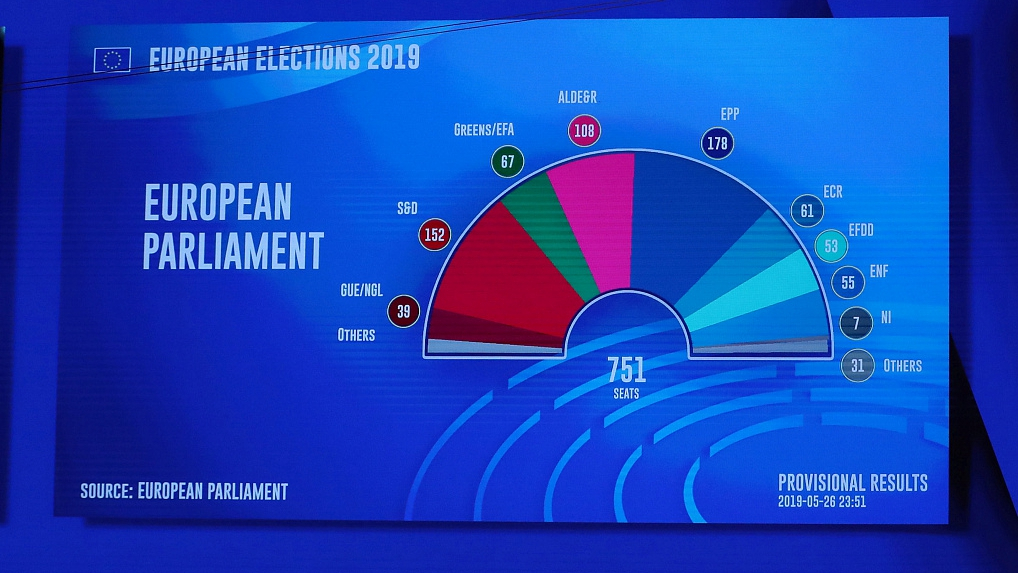Pivotal European Parliament elections have seen a two-decade-high turnout and resulted in gains for nationalists, greens and liberals at the expense of the established centrist power blocs.
Lengthy negotiations between parties and between national leaders – and likely tensions between the European Parliament and European Council – will follow over the coming weeks in an increasingly fragmented European Union.
Read more:
With the provisional results in, what were the key trends and what happens next?
1. Who will form a new coalition?
The balance of power in the 751-seat European Parliament has swung with the results – not a complete changing of the guard, but a significant shift which will see at least one new grouping enter a governing coalition or alliance.
The center-right European People's Party (179 seats, down 42 from 2014) will likely again team up with the center-left Social Democrats (150 seats, down 41) but alongside the Greens (70 seats, up 20) or the Alliance of Liberals and Democrats for Europe (107 seats, up 40) – or both.
The EPP and S&D have governed together since 1979, so this is a major change – how well multi-party governing can work in the parliament is untested. Whether a coalition or looser alliance is hammered out over the coming weeks, a firmly pro-EU majority with a greater emphasis on environmental issues looks the most likely endgame.
2. Pro-EU vote dominates, Greens surge
The rise of populist-nationalists dominated headlines in the run-up to the elections, but pro-EU parties ultimately won around two-thirds of the seats in polls where turnout was up by almost 10 percent on 2014.
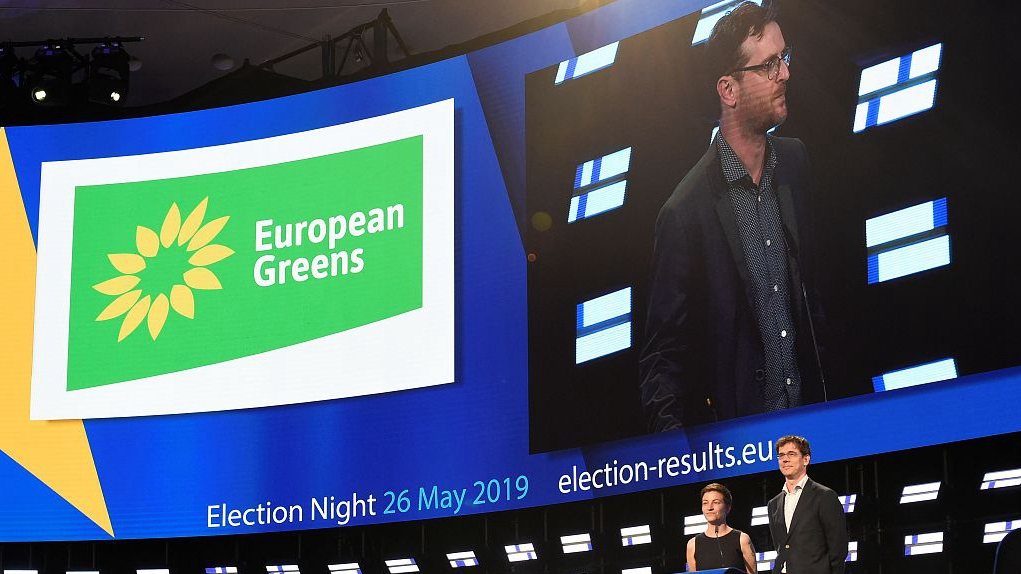
European Green Party leading candidates Ska Keller from Germany (L) and Bas Eickhout from the Netherlands give a speech on election night in Brussels, May 26, 2019. /VCG Photo
European Green Party leading candidates Ska Keller from Germany (L) and Bas Eickhout from the Netherlands give a speech on election night in Brussels, May 26, 2019. /VCG Photo
The strongly pro-EU Liberals were helped by the addition of French President Emmanuel Macron's party, winning 40 additional seats, and the surge of the Greens highlighted an increasing focus on environmental issues.
Climate change was a major issue on the campaign trail and the Greens, boosted by younger activists, in particular, had some eye-opening results. The most notable was in Germany, where the party moved into second place on a bad night for Chancellor Angela Merkel's Christian Democratic Union and coalition partner the Social Democrats.
3. Salvini, Le Pen, Farage win – can they work together?
Populist-nationalists parties topped the polls in France, Italy and the United Kingdom, but elsewhere in the bloc – for example in Germany, Spain and Denmark – underperformed. Gains were made at the expense of the established parties, but not to the scale the mainstream feared.
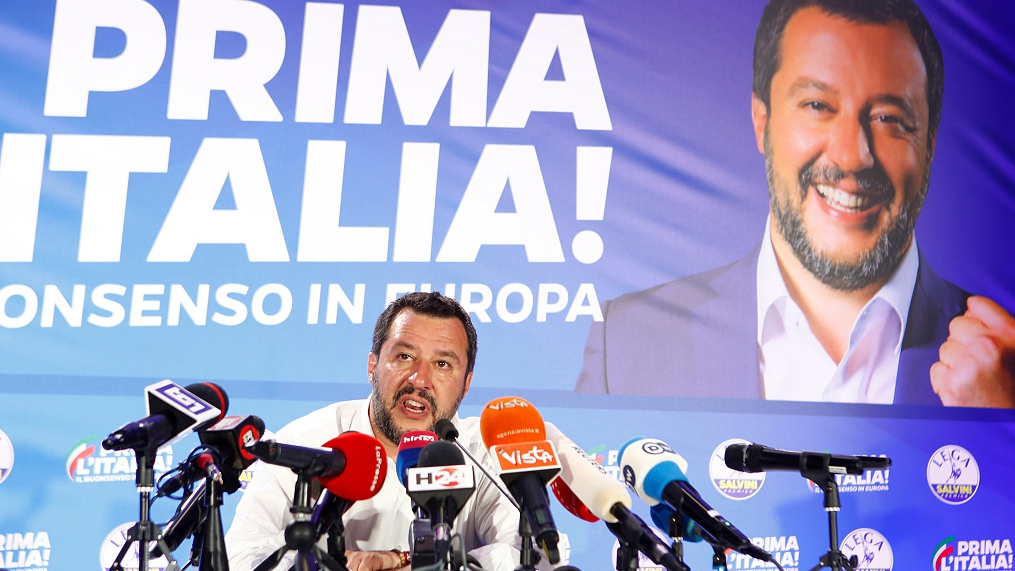
Leader of Italy's far-right League party Matteo Salvini speaks during his European Parliament election night event in Milan, Italy, May 27, 2019. /VCG Photo
Leader of Italy's far-right League party Matteo Salvini speaks during his European Parliament election night event in Milan, Italy, May 27, 2019. /VCG Photo
The question now is, can those who were elected work together? The idea of creating a pan-European alliance of nationalist parties has its contradictions, and some of the national parties have entirely different platforms. But if they can coalesce around basic principles, probably under Italian Deputy Prime Minister Matteo Salvini, they will be a powerful bloc in the parliament.
Another key player is Hungarian Prime Minister Viktor Orban, whose Fidesz party had a very good night winning 52 percent of the vote. His next move will be closely watched – he could quit the EPP and join a new nationalist alliance.
4. What does it mean for the top jobs?
The biggest jobs in the European are all up for grabs over the coming months: European Commission president, European Council president, and top diplomat among them.
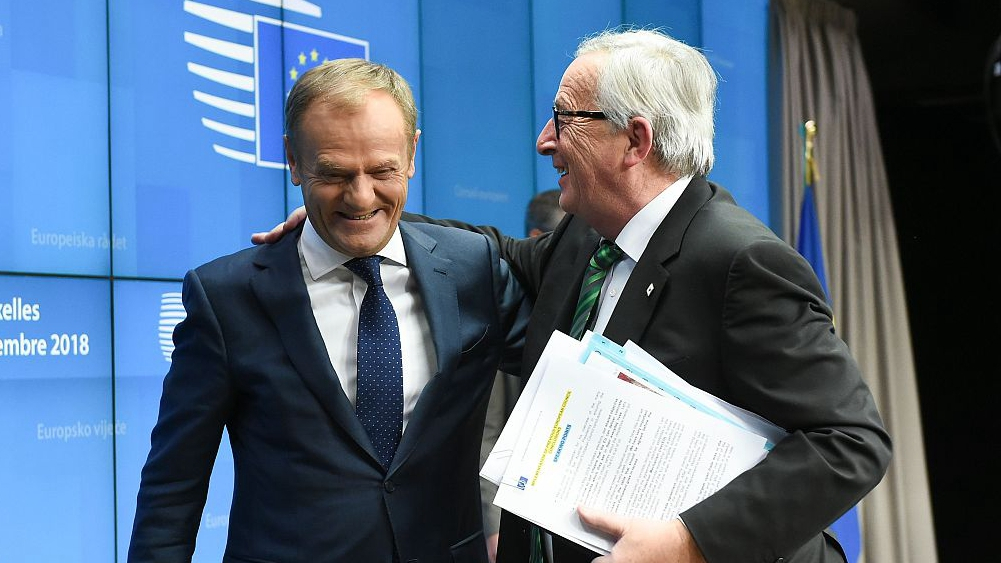
European Commission President Jean Claude Juncker (R) and European Council President Donald Tusk (L) share a moment after a press conference in Brussels, December 13, 2018. /VCG Photo
European Commission President Jean Claude Juncker (R) and European Council President Donald Tusk (L) share a moment after a press conference in Brussels, December 13, 2018. /VCG Photo
National leaders – who make up the European Council – will gather in Brussels on Tuesday to begin discussions on who should take on the top jobs, with the rise of smaller groupings and shrinking of the traditional powerhouses likely to make the negotiations particularly complicated.
And expect tensions between the Parliament and the Council, particularly over the pick to head the European Commission, the most influential post in the bloc. The Parliament believes it should decide who succeeds Jean-Claude Juncker, the Council insists it will have the final say. A long and messy battle is likely to follow.
5. And… domestic consequences?
The EU elections could have dramatic repercussions in many member states.
In Greece, Prime Minister Alexis Tsipras announced snap elections after his Syriza party came in second to the opposition New Democracy.
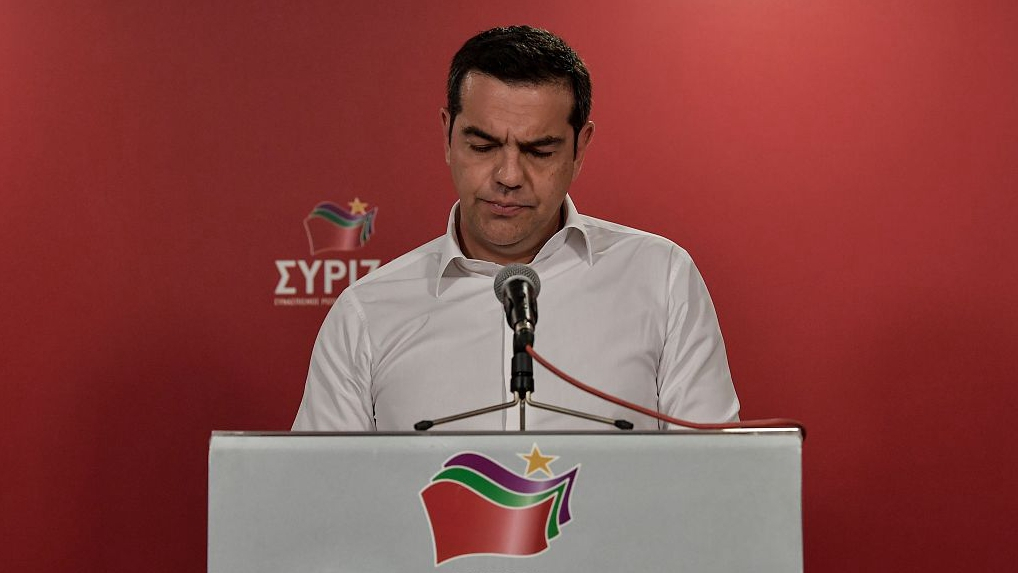
Greek Prime Minister Alexis Tsipras delivers a speech after the European parliamentary elections in Athens, May 26, 2019. /VCG Photo
Greek Prime Minister Alexis Tsipras delivers a speech after the European parliamentary elections in Athens, May 26, 2019. /VCG Photo
In Britain, the governing Conservatives suffered their worst result in history, and a new pro-Brexit party topped the polls with almost 32 percent – a result which will give those battling to replace Theresa May as prime minister much to think about. Pro-EU parties also performed well, with the Liberal Democrats and Greens among those winning a combined 40 percent.
In Germany, the coalition is under renewed pressure following the poor performance of both the CDU and SPD. In France, Marine Le Pen called for national elections after her National Rally beat Macron's centrist party by around two points. In Italy, Matteo Salvini could try to force a change in government with his League party riding high.
And in Austria, the governing People's Party won a record 34.9 percent, and the Freedom Party took 17.5 percent – neither appears to have suffered as a result of
the recent Ibiza-gate scandal.

